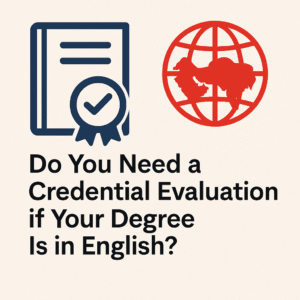
If you earned your degree in English, you might wonder whether a credential evaluation is still necessary when applying to a university abroad. The short answer? Yes, in most cases.
While English-medium instruction can make your transcripts easier to understand, it does not replace the need for a formal academic evaluation. This blog post breaks down why credential evaluations are required, who needs them, and what different countries expect, even if your degree is in English.
What Is a Credential Evaluation?
A credential evaluation determines how your educational qualifications compare to those in the destination country. It typically involves:
- Verifying the authenticity of transcripts and diplomas
- Converting grades and course credits
- Confirming degree equivalency (e.g., is your bachelor’s equal to a U.S. bachelor’s?)
Evaluations help universities and employers understand international qualifications and ensure fair admissions decisions.
English-Medium Instruction ≠ Automatic Recognition
It’s a common misconception that studying in English removes the need for academic evaluation. In reality,
Language of instruction is not the same as academic equivalency.
For example, you earned a bachelor’s degree in English from a private university in Nigeria, India, or the UAE. In that case, the degree may still need to be evaluated to confirm that it meets standards in the U.S., U.K., or Canada.
Why Evaluations Are Still Needed
Even if your degree is in English, host universities want to know:
- Is the degree program officially recognized by the issuing country’s ministry of education?
- Is the curriculum equivalent to what is offered locally?
- What is the GPA or credit system used?
- Were your grades awarded fairly and transparently?
Credential evaluations answer these questions. In many cases, they are required for admissions, scholarships, credit transfer, or visa applications.
Common English-Medium Institutions Requiring Evaluation Abroad
| Institution | Country | Notes |
| American University of Beirut | Lebanon | Accredited, taught in English; still requires evaluation for U.S./UK/Canada. |
| Ashesi University | Ghana | Well-known in Africa; requires WES or similar for graduate admissions overseas. |
| University of Malaya | Malaysia | Ranked internationally, evaluations are typically required for Europe and North America. |
| American University in Cairo | Egypt | U.S.-style education; credential evaluation still needed for grad school abroad. |
| Manipal Academy of Higher Education | India | Taught in English; U.S. grad programs usually request an AICE-member evaluation. |
| Mahidol University International College | Thailand | Degrees in English; evaluation often required outside ASEAN. |
Do Major Study Destinations Require Credential Evaluations?
Here’s a breakdown by destination:
| Destination | English-Taught Degrees Accepted Without Evaluation? | Notes |
| United States | Rarely | Most schools require a course-by-course evaluation from WES, ECE, ACEI, etc., regardless of language. |
| United Kingdom | Sometimes | UK ENIC may be needed; some universities assess transcripts directly. Recognition of prior study depends on familiarity. |
| Canada | Rarely | Most grad programs require a WES Canada or IQAS evaluation. |
| Australia | Sometimes | Schools may refer to government-issued qualification frameworks, depending on the country of origin. |
| Germany | Often | Use the Anabin database and APS (for countries such as Vietnam, China, and India). English-medium degrees still need verification. |
| Netherlands | Often | Requires diploma and transcript assessments; often uses Nuffic or in-house evaluation. |
| Japan | Sometimes | Public universities evaluate transcripts internally. Private programs may ask for evaluations. |
| South Korea | Sometimes | Evaluation is not always required, but documents must be verified, translated, and certified. |
| UAE & Qatar | Sometimes | For foreign university applications, evaluations are often needed; for local schools, internal policies vary. |
Undergraduate vs. Graduate: Who Needs It More?
- Undergraduate Students:
- Some may be admitted based on national exam results (e.g., A-levels, IB).
- Others will need a credential evaluation, especially if coming from unfamiliar systems.
- Graduate Students:
- Almost always required. Master’s and PhD programs want assurance that a prior degree meets academic standards.
- Course-by-course evaluations help admissions committees compare academic rigor.
Online & Transnational Programs
If you completed a degree online or through a branch campus (e.g., University of London in Malaysia), credential evaluations are typically still required. The mode of instruction (online or on-site) doesn’t remove the need to validate academic equivalency.
Pro Tip: Ensure the parent institution is accredited and recognized by its national authority. That determines if your credential is valid for evaluation.
Tips for Students with English-Taught Degrees
- Don’t assume English means exemption. Always check university or immigration guidelines.
- Use a recognized evaluation agency. For the U.S., choose an AICE-endorsed member institution, such as ACEI. For the UK, refer to UK ENIC and check if evaluations from Endorsed Members of AICE will also be accepted..
- Have official documents ready. This includes transcripts, diplomas, and (sometimes) syllabi.
- Allow time. Evaluations can take 1–4 weeks, so plan ahead of deadlines.
- Check for exceptions. Some U.S. or U.K. schools may evaluate transcripts directly from well-known institutions.
Final Thoughts
Having a degree taught in English can help smooth the admissions process, but it’s not a substitute for academic evaluation. Most destination countries still require formal credential evaluations to verify the legitimacy and academic equivalence of credentials.
At ACEI, we specialize in helping students from around the world translate their academic achievements into globally recognized credentials. Learn more about our credential evaluation services and make sure your English-taught degree opens every door you deserve.
Need help? If you’re unsure whether your degree requires an evaluation, please contact ACEI. We’ll guide you through the process and help you determine the best approach, tailored to your academic background and target country.
